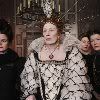
There have long been skepticism and theories on the authenticity of Shakespeare's body of work: What if Shakespeare never wrote a single word? Roland Emmerich's new film, Anonymous, takes that question and runs with it.
 After Edward De Vere (Rhys Ifans) sees a play penned by Ben Jonson (Sebastian Armesto), he decides to procure Jonson's service. It turns out Edward is a prolific and talented writer, but due to his status as Earl of Oxford, he can't let anyone know that part of him. In exchange for Jonson's vow of silence, Edward promises him a steady stream of money and fame.
After Edward De Vere (Rhys Ifans) sees a play penned by Ben Jonson (Sebastian Armesto), he decides to procure Jonson's service. It turns out Edward is a prolific and talented writer, but due to his status as Earl of Oxford, he can't let anyone know that part of him. In exchange for Jonson's vow of silence, Edward promises him a steady stream of money and fame. At the end of the first production, however, things get out of hand. The play is an enormous hit, and the crowd demands to meet the writer. Jonson hesitates, and Edward is distraught. An actor, William Shakespeare, decides to claim the credit. The truth is, Shakespeare is illiterate, but Jonson and Edward continues the charade -- for Jonson, he gets to keep the money and stay out of potential political trouble (as the plays can be political risqué), and Edward lives to see his plays produced and admired.
At the end of the first production, however, things get out of hand. The play is an enormous hit, and the crowd demands to meet the writer. Jonson hesitates, and Edward is distraught. An actor, William Shakespeare, decides to claim the credit. The truth is, Shakespeare is illiterate, but Jonson and Edward continues the charade -- for Jonson, he gets to keep the money and stay out of potential political trouble (as the plays can be political risqué), and Edward lives to see his plays produced and admired. Yet good things don't last for long. The plays stir the interest of Queen Elizabeth (Vanessa Redgrave), to the dismay of her advisor William Cecil (David Thewlis) and his son Robert (Edward Hogg). The Cecils want James of Scotland to succeed the Queen, but she wants the Earl of Essex (Sam Reid), who is a good friend of Edward and the Earl of Southampton (Xavier Samuel). The rivalry causes the Cecils to scheme against Essex.
Yet good things don't last for long. The plays stir the interest of Queen Elizabeth (Vanessa Redgrave), to the dismay of her advisor William Cecil (David Thewlis) and his son Robert (Edward Hogg). The Cecils want James of Scotland to succeed the Queen, but she wants the Earl of Essex (Sam Reid), who is a good friend of Edward and the Earl of Southampton (Xavier Samuel). The rivalry causes the Cecils to scheme against Essex. I've always liked Rhys Ifans (Harry Potter and the Deathly Hallows), particularly when he plays peculiar characters. He plays it straight here, however, as Earl of Oxford, and it's a marvelous job. He is handsome, debonaire, refined, and intellectual - exactly what we'd expect from the person who gave us masterpieces such as Romeo & Juliet or King Lear. As Queen Elizabeth I, Vanessa Redgrave (Letters to Juliet) is magnificent in portraying the character's confusion, anguish and internal turmoil. Both are great tragic characters played by great performers.
I've always liked Rhys Ifans (Harry Potter and the Deathly Hallows), particularly when he plays peculiar characters. He plays it straight here, however, as Earl of Oxford, and it's a marvelous job. He is handsome, debonaire, refined, and intellectual - exactly what we'd expect from the person who gave us masterpieces such as Romeo & Juliet or King Lear. As Queen Elizabeth I, Vanessa Redgrave (Letters to Juliet) is magnificent in portraying the character's confusion, anguish and internal turmoil. Both are great tragic characters played by great performers. As their younger counterparts, Jamie Campbell Bower (Harry Potter and the Deathly Hallows) and Joely Richardson (The Last Mimzy) are dashing and spirited with great chemistry together. Sebatian Armesto (Bright Star) seems a bit slight and contemporary to play Ben Jonson, but Rafe Spall (One Day) gives us a William Shakespeare we love to hate. While Armesto is somewhat too modest and passive, Spall is brash and obnoxious.
As their younger counterparts, Jamie Campbell Bower (Harry Potter and the Deathly Hallows) and Joely Richardson (The Last Mimzy) are dashing and spirited with great chemistry together. Sebatian Armesto (Bright Star) seems a bit slight and contemporary to play Ben Jonson, but Rafe Spall (One Day) gives us a William Shakespeare we love to hate. While Armesto is somewhat too modest and passive, Spall is brash and obnoxious. The rest of the cast is excellent. David Thewlis (Harry Potter and the Deathly Hallows) is superbly sinister and secretive as William Cecil, while Edward Hogg (Alfie) is creepy and broody as Robert Cecil. Xavier Samuel (Eclipse) and Sam Reid (All Saints) play Earl of Southampton and Earl of Essex, respectively, as two frat boys -- they are somewhat too contemporary for my taste.
The rest of the cast is excellent. David Thewlis (Harry Potter and the Deathly Hallows) is superbly sinister and secretive as William Cecil, while Edward Hogg (Alfie) is creepy and broody as Robert Cecil. Xavier Samuel (Eclipse) and Sam Reid (All Saints) play Earl of Southampton and Earl of Essex, respectively, as two frat boys -- they are somewhat too contemporary for my taste. The screenplay by John Orloff (A Mighty Heart) follows a nonlinear storytelling structure with multiple flashbacks, sometimes flashback within flashback. Not to mention the unnecessary bookends. The structure can be confusing at times. Also, the plot threads don't necessarily connect until later. The main plot, of course, is the true identity of the writer behind the works of William Shakespeare, but we get more than we bargain for. We also get a political drama based on the Essex Rebellion, and a series of conspiracies.
The screenplay by John Orloff (A Mighty Heart) follows a nonlinear storytelling structure with multiple flashbacks, sometimes flashback within flashback. Not to mention the unnecessary bookends. The structure can be confusing at times. Also, the plot threads don't necessarily connect until later. The main plot, of course, is the true identity of the writer behind the works of William Shakespeare, but we get more than we bargain for. We also get a political drama based on the Essex Rebellion, and a series of conspiracies. The problem is, the plot and subplots become cumbersome after a while. I have some problem keeping track of all the relationships and secrets and who is doing what to whom. In truth, the main plot of "who is William Shakespeare?" takes a backseat to the conspiracy and political scheming. Certainly that is more thrilling (who doesn't like dirty politics and mayhem?) but it starts to lose the charm and intrigue. It also takes the focus away from the brilliance of and reactions to Edward's work.
The problem is, the plot and subplots become cumbersome after a while. I have some problem keeping track of all the relationships and secrets and who is doing what to whom. In truth, the main plot of "who is William Shakespeare?" takes a backseat to the conspiracy and political scheming. Certainly that is more thrilling (who doesn't like dirty politics and mayhem?) but it starts to lose the charm and intrigue. It also takes the focus away from the brilliance of and reactions to Edward's work. Also, by wrapping the story around historical events such as the Essex Rebellion, we come to expect the outcome, and the intrigue becomes one of alternate reality and theory, instead of true mystery. Besides, once we know how it's going to end, there is no positive payoff. Tragedies are fine, but there still needs to be certain payoff to make the experience worthwhile: Romeo and Juliet's deaths result in the resolve of their families' feud, for example. The ending of Anonymous, in comparison, is all too depressing.
Also, by wrapping the story around historical events such as the Essex Rebellion, we come to expect the outcome, and the intrigue becomes one of alternate reality and theory, instead of true mystery. Besides, once we know how it's going to end, there is no positive payoff. Tragedies are fine, but there still needs to be certain payoff to make the experience worthwhile: Romeo and Juliet's deaths result in the resolve of their families' feud, for example. The ending of Anonymous, in comparison, is all too depressing. Roland Emmerich's (2012) direction is effective and powerful, however. Emmerich's departure from sci-fi or fantasy is also interesting, and surprisingly he has a good eye for the period. The production is lush and gorgeous, and he uses the special effects to create certain epic and poetic feel. Over all, he's succeeded in giving us something fantastic to behold.
Roland Emmerich's (2012) direction is effective and powerful, however. Emmerich's departure from sci-fi or fantasy is also interesting, and surprisingly he has a good eye for the period. The production is lush and gorgeous, and he uses the special effects to create certain epic and poetic feel. Over all, he's succeeded in giving us something fantastic to behold.If only the storytelling was more concise and less convoluted and bloated, the film could have been a delight. It is not utter crap, of course, but it's far from being first class. -- reviewed by Anonymous
Stars: Rhys Ifans, Vanessa Redgrave, Sebastian Armesto, Rafe Spall, David Thewlis, Edward Hogg, Xavier Samuel, Sam Reid, Jamie Campbell Bower, Joely Richardson
Director: Roland Emmerich
Writer: John Orloff
Distributor: Sony Pictures
MPAA Rating: PG-13 for violence and sexual content
Running Time: 130 minutes
Ratings:
Script - 7
Performance - 8
Direction - 7
Cinematography - 8
Music/Sound - 7
Editing - 8
Production - 9
Total - 7.8 out of 10.0
No comments:
Post a Comment